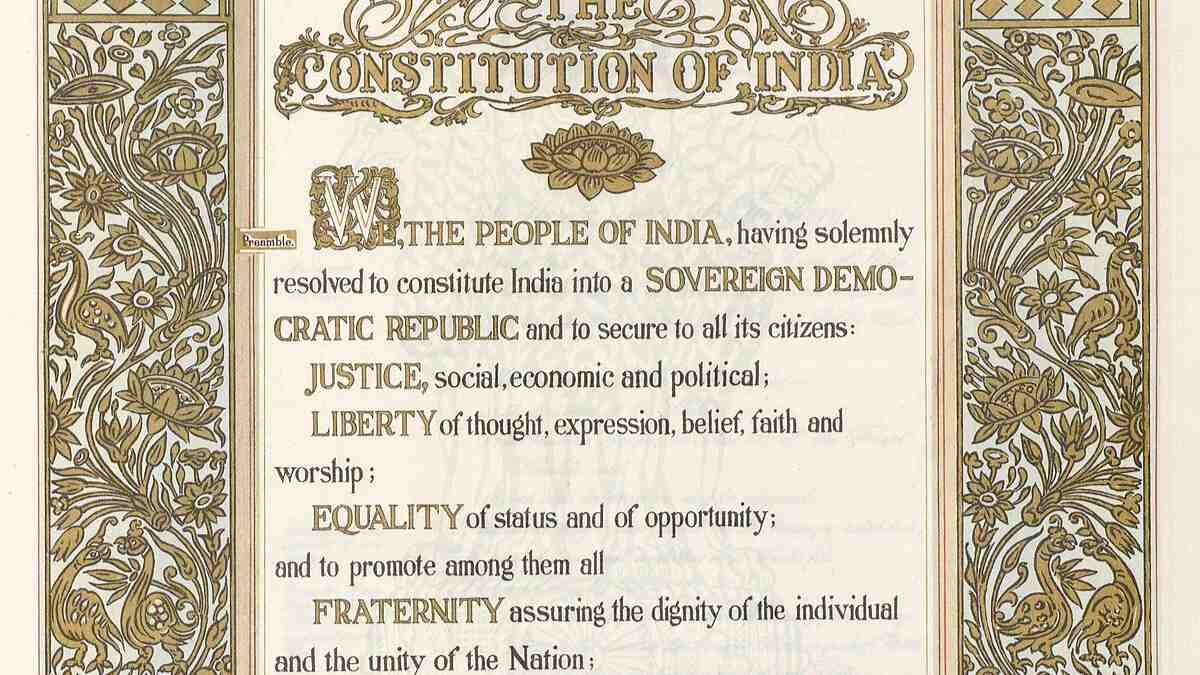As the Constitution Debate has picked up in Parliament with the main opposition Congress Party coming with hammer and tongs against the ruling BJP over the issue of secularism, the debate has taken an interesting twist with the provision of secularism in the Indian Constitution in the true sense.
It may be recalled that the word ‘secularism’ was not included in the original Indian Constitution and it was added to it by the 42nd Constitution Amendment in 196 when Indira Gandhi was the Prime Minister of the country.
SR Bommai Case
However, the Supreme Court said in its verdict in the famous S. R. Bommai v. Union of India case in 1994 that India was secular since the formation of the republic in 1952.
The apex court said in its judgment, “In matters of State, religion has no place. Any State government which pursues nonsecular policies or nonsecular course of action acts contrary to the constitutional mandate and renders itself amenable to action under Article 356”.
Preamble
After the term secular was added to it by the 42nd Constitution Amendment, the Preamble of the Constitution of India proclaims India as a “Sovereign, Socialist, Secular, Democratic, Republic”.
Article 15
Article 15 says in clear terms that the State shall not discriminate against any citizen on the grounds of religion, race, caste, sex, place of birth or any of them.
It also makes it clear that no citizen shall, on grounds only of religion, race, caste, sex, place of birth, or any of them, be subject to any disability, liability, restriction, or condition about access to shops, public restaurants, hotels and places of public entertainment; or the use of wells, tanks, bathing ghats, roads and places of public resort maintained wholly or partly out of State funds or dedicated to the use of the general public.
Article 25
Article 25 of the Indian Constitution guarantees the freedom of religion to all citizens, subject to some restrictions.
It makes it clear that everyone has the right to freedom of conscience.
Citizens of India have the right to freely profess, practice, and propagate religion.
However, the Constitution also says that these freedoms are subject to public order, morality, and health.
There are clear instructions in the Constitution that the state can make laws to regulate or restrict secular activities associated with religious practices.
It has also been said that these activities include social reforms, economic activities, and other activities unrelated to the core aspects of religion.
According to the Indian Constitution, the state has the power to acquire places of worship such as mosques, churches, and temples.
Article 26
Article 26 of the Constitution gives religious denominations the right to manage their religious affairs, including establishing and maintaining religious and charitable institutions, managing their religious affairs, owning and acquiring movable and immovable property, and administering their property by law.
However, this article is subject to public order, morality, and health.
Article 27
Article 27 of the Indian Constitution protects citizens’ religious freedom and equality by prohibiting the state from using taxes to promote or maintain a specific religion. It says in clear terms that the taxpayers’ money is not used to support any particular religious agenda.
The Article upholds the principle of religious neutrality. It also prevents the use of public funds for the advancement of a particular religious belief or institution.
Article 27 prohibits only the levy of a tax, not a fee.
Article 28
Article 28 Article protects the freedom of religion in educational institutions funded by the state.
It has been said in this article that individuals, religious groups, and educational institutions have the right to choose not to participate in religious activities.
They have the right to practice their religious faith, attend religious ceremonies, participate in religious worship and receive religious instruction.
Article 30
Article 30 the Indian Constitution ensures minorities’ rights to establish and administer their own educational institutions.
It says that all minorities, whether based on religion or language, shall have the right to establish and administer educational institutions of their choice.
It also says that in making any law providing for the compulsory acquisition of any property of an educational institution established and administered by a minority, the State shall ensure that the amount fixed by or determined under such law for the acquisition of such property is such as would not restrict or abrogate the right guaranteed under that clause.
It has also been said that the state shall not discriminate against any educational institution on the grounds that it is under the management of a minority, whether based on religion or language.
It is important to recall these provisions made in the Indian Constitution because certain Hindutva forces have begun arguing that India was not a secular state as the word secularism was not added in the original Constitution.
They also argue that since it was added by a Constitutional amendment, it may be removed by another constitutional amendment.













